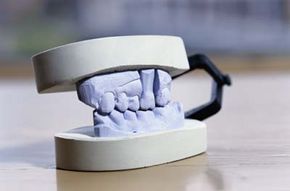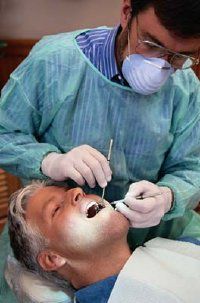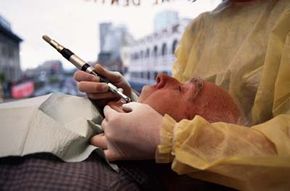The word disease may sound a bit scary, but we all know too well that things can go wrong with teeth. However, the good news is that since most dental afflictions begin with poor oral hygiene, they are quite preventable. To prepare yourself for oral self-defense, you must first know your enemies.
In this article, we'll learn about how plaque, cavities, periodontal disease, and stress-related dental problems can affect your dental health. Here's a preview:
Advertisement
- PlaquePlaque is an excessive accumulation of the bacteria and germs that normally live in your mouth. When plaque forms, a gelatinous substance protects the oral bacteria, allowing it to thrive and manufacture tooth-eating acids. Over time, plaque can harden into tartar, which has the potential to do even more damage. The best defense against plaque and tartar is good oral hygiene.
- CavitiesCavities are holes where bacteria have eaten through a tooth's enamel. These decayed pits must be drilled out and filled in order to stop their destruction. There are three primary types of cavities, or caries: pit-and-fissure caries, smooth-surface caries, and root caries. All types of cavities require the attention of a dentist.
- Periodontal DiseasePeriodontal disease is, literally, disease "around the tooth" -- disease of the gums. Gingivitis is an inflammation of the gum tissue caused by plaque and tartar. Left untreated, gingivitis can develop into periodontitis, a more serious disorder that causes gum recession, damage to soft and hard tissues, and eventually tooth loss.
- Stress-Related Dental ProblemsTemporomandibular joint syndrome (TMJ) and myofacial pain dysfunciton (MPD) are two stress-related disorders that can cause pain in the teeth and jaw. Signs of these disorders include tenderness or tension in the cheek muscles, an inability to open your mouth wide, and a clicking, cracking, or popping sensation when you open your mouth. These disorders most commonly strike women in their 20s and 30s but can affect anyone of any age.
Your mouth is filled with bacteria that, when left alone, can develop into plaque and eventually tartar. Go to the next page to learn about how plaque can cause serious damage to your teeth and periodontia.
Your teeth need lots of care and attention to ensure life-long good oral health. Visit the links below for more information about protecting and caring for your teeth.
- Good oral hygine is important for oral health as well as overall health. In How Oral Hygiene Works, learn how to best take care of your pearly whites.
- Do you wish your teeth had just a bit more sparkle to them? How Tooth Whitening Works takes a look at procedures you can undergo to brighten and whiten your teeth.
- When you have an ache in your teeth, getting rid of it is the only thought in your head. In How to Relieve a Tooth Ache, find out how to deal with dental distress.
This information is solely for informational purposes. IT IS NOT INTENDED TO PROVIDE MEDICAL ADVICE. Neither the Editors of Consumer Guide (R), Publications International, Ltd., the author nor publisher take responsibility for any possible consequences from any treatment, procedure, exercise, dietary modification, action or application of medication which results from reading or following the information contained in this information. The publication of this information does not constitute the practice of medicine, and this information does not replace the advice of your physician or other health care provider. Before undertaking any course of treatment, the reader must seek the advice of their physician or other health care provider.
Advertisement



